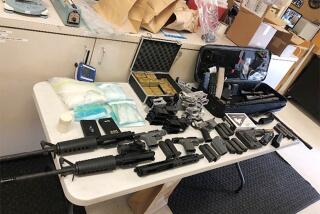FBI Sting Nets 47 in Cleveland Probe of Police
- Share via
CHICAGO — Thirty current or former Cleveland police officers were among 47 people named in federal indictments unsealed Thursday in Cleveland following a 2 1/2-year FBI undercover probe of corruption.
The charges include extortion, obstruction of justice and narcotics and gambling violations--all stemming from two gambling operations established and operated by undercover FBI agents.
“We were paying (police officers) for protection and paying people to operate the games, to act as lookouts and to make sure we weren’t robbed or embezzled,” FBI Cleveland Agent-in-Charge William Branon said in an interview.
In addition, Branon said, police officers accepted payments to protect the gamblers from other police officers. “They would supply us with information or records concerning investigations or impending arrests,” he said.
Officials said the officers were from police districts all over the city. The two FBI gambling dens--which featured blackjack, poker, craps and other casino-type games--were set up on both the west and east sides of town, attracting officers from throughout the city.
One group of officers is charged with taking money to protect two separate 500-pound marijuana transactions, which took place at the gambling operation on the East Side.
“The drugs went from one group of FBI undercover agents to another group, with protection supplied by police officers,” Branon said.
“We made individual payments anywhere from $50 to $1,000 during the course of the undercover operation,” Branon said. “The payments were usually in the vicinity of $300 to $400 paid to an individual per activity.”
Those indicted face fines ranging from $250,000 to $2 million and prison sentences of up 40 years, said Joyce J. George, U.S. attorney for the Northern District of Ohio.
Cleveland police officials became aware of the FBI investigation last August while conducting their own corruption investigation. That investigation, begun after a citizen tip, centered on Norbert Berendsen, a 23-year department veteran who also owned a West Side bar where after-hours gambling took place.
The patrol officer was convicted last year and dismissed from the force. He was among those named in the current indictments on federal charges.
After finding out about the FBI probe, police officials cooperated with the federal investigation.
Twenty-three officers still on the force, including three sergeants, were among those named in the indictments, which were issued Wednesday and not unsealed until Thursday. In addition, seven officers who had retired or been dismissed from the force were indicted.
Also included in the indictments were a Chicago parks service police officer and 16 people who are not connected with law enforcement.
“Some may perceive this as a dark day for the Cleveland Police Department and the City of Cleveland,” said Mayor Michael R. White at an afternoon press conference in which he expressed confidence in Police Chief Edward P. Kovacic. “I believe that what will emerge from this process is a stronger and healthier police department that all residents in Cleveland can support and be proud of.”
The FBI investigation began before White took office and appointed Kovacic as chief.
Branon was vague about what prompted the investigation, saying only that the FBI had received “allegations of certain types of corruption.”
While the undercover operation has ended, he said the investigation is continuing and more arrests are possible.
“We have not closed this thing down,” he said. “We still have an awful lot of information.”
White acknowledged that the suspensions of 23 officers could cause “moderate lapses” in police service, but he said the graduation of a 66-member police cadet class in July would minimize any problems that might occur.
The police force has 1,690 officers.
Lt. Martin Flask, spokesman for the police department, said arrests were made early Thursday at various police department locations and at suspects’ homes. Police officers were relieved of their uniforms before being arraigned in federal court, he said.
The sting was similar to another FBI undercover operation in Detroit that resulted last week in 10 city and suburban police officers being charged with accepting money to guard cocaine transactions.
Branon and George said, however, that there was no connection between the two FBI stings, and no coordinated federal crackdown on police corruption.
“Public corruption is a national priority with the FBI,” Branon said.
More to Read
Sign up for Essential California
The most important California stories and recommendations in your inbox every morning.
You may occasionally receive promotional content from the Los Angeles Times.










